May 27, 2025 | 08:09 GMT +7
May 27, 2025 | 08:09 GMT +7
Hotline: 0913.378.918
May 27, 2025 | 08:09 GMT +7
Hotline: 0913.378.918
The Party and the State have implemented multiple decisions and solutions to promote the potential and advantages for socio-economic development in the Mekong Delta. Namely, the State has promulgated a series of regional resolutions including Resolution No. 13-NQ/TW by the Politburo on the orientation of socio-economic development, national defense and security in the Mekong Delta towards 2030, with vision to 2045; or "Golden" Resolution No. 120/NQ-CP on sustainable development in the Mekong Delta to adapt to climate change and most recently Resolution No. 78/NQ-CP on the Government's action plan to implement Resolution No. No. 13-NQ/TW. The Prime Minister also issued Decision No. 825/QD-TTg on the the operational regulations of the Coordinating Council of the Mekong Delta from 2020 to 2025.
Mekong Delta with "new opportunities and advantages" in the context of the aforementioned decisions has opened up many investment possibilities and promoted regional development in the near future.
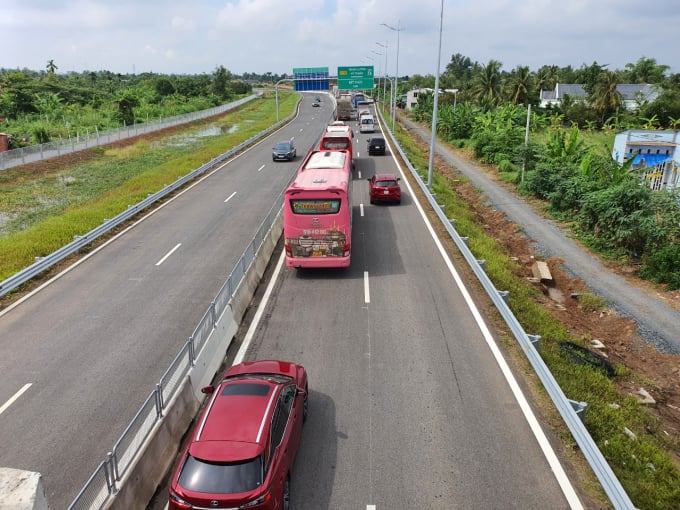
86,000 billion VND from the state budget was allocated by the National Assembly to focus on breakthrough development of the expressway system in the Mekong Delta region. Photo: Kim Anh.
The Mekong Delta Master Plan focuses on developing infrastructure as a platform for socio-economic development and promoting linkages in the Mekong Delta. The plan pays special attention to the development of the transport infrastructure. By 2030, the plan aims to invest in constructing and upgrading nearly 830km of highways, 4,000km of national highways, 4 airports, 13 seaports, 11 clusters of passenger ports and 13 clusters of inland waterway cargo ports.
According to the data given by the Minister of Transport and Communications Nguyen Van The, 86,000 billion VND from the State budget was allocated by the National Assembly to focus on breakthrough development of the expressway system in the Mekong Delta.
“We determined that the expressway development must be in tandem with economic development, so the ending point of this expressway system will be connected to Tran De port. From Tran De port, 100,000-ton vessels are only 60km from Can Tho city. With a system of highways along with Tran De port and Can Tho international airport, we firmly believe that after this term, the Mekong Delta will be a favorable location for economic development. Namely, domestic and foreign investors can visit the region and form industrial parks", said Minister Nguyen Van The.
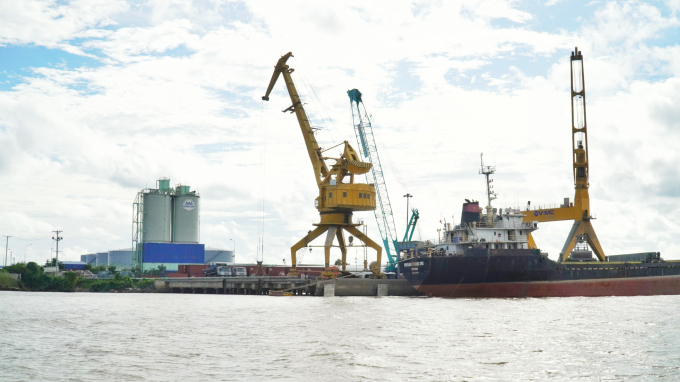
The total state budget investment in the Mekong Delta is expected to reach 460 trillion VND from 2021 to 2025. Photo: Kim Anh.
Additionally, the expected investment figure for the Mekong Delta region is given by the Minister of Planning and Investment Nguyen Chi Dung. From 2021 to 2025, the total state budget capital to support projects in the region are estimated at 320 trillion VND, an increase of 23.3% compared to the period of 2016-2020.
Furthermore, the state budget investment to implement projects in the Mekong Delta through the Ministry of Transport and Communications, Ministry of Agriculture and Rural Development, Ministry of Health, etc. reaches approximately 140 thousand billion VND.
With these sources of capital support, the total state budget investment is expected to reach 460 trillion VND from 2021 to 2025.
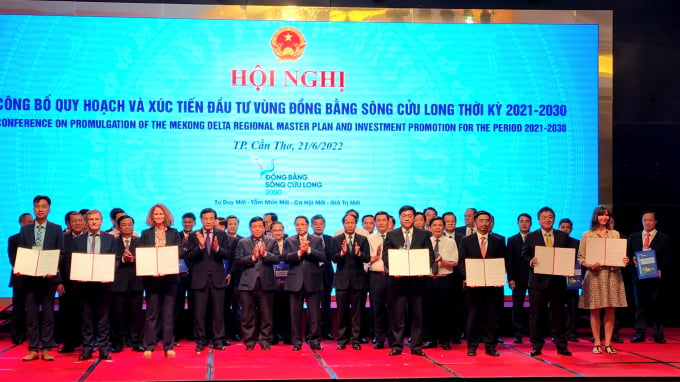
6 development banks have committed to sponsor 2.2 billion USD to implement 20 regional linkage projects from 2021 to 2025. Photo: Kim Anh.
Under the implementation of Resolution No. 120, the Ministry of Planning and Investment, in collaboration with the Ministry of Agriculture and Rural Development, the Ministry of Transport and Communications as well as 13 provinces and cities in the Mekong Delta, worked with 6 development banks, including the Asia Development Bank (ADB), Korea Export-Import Bank (KEXIM), French Development Agency (AFD), German Reconstruction Bank (KfW), Japan International Cooperation Agency (JICA) and World Bank (WB) to finance 2.2 billion USD to implement 20 regional linkage projects from 2021 - 2025. This will be a substantial support, helping the Government, Ministries and Mekong Delta's government, people increase investment, create breakthroughs in the regional infrastructure development.
With the regional advantage in agricultural development, the Ministry of Planning and Investment has determined that changing the mindset on food security is a strategic breakthrough in the Mekong Delta Development Plan. According to Minister Nguyen Chi Dung, switching from developing rice-based agricultureto aquatic products, fruits, and rice will be suitable for the market, on the basis of rearranging and reorganizing production zoning with regards to water and soil resources.
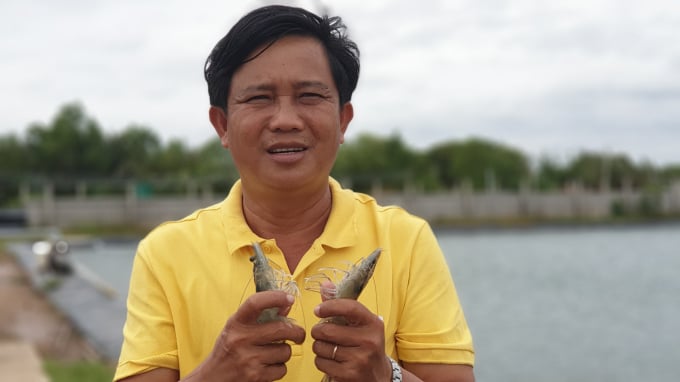
The Mekong Delta plan identifies that agricultural development in the direction of fisheries, fruits, and rice will be suitable for the market. Photo: Kim Anh.
Can Tho city is a dynamic development areas, the core urban area of the Mekong Delta, the gateway connecting the region with the world market. The city enhances the connection of transport infrastructure between the city and the region to ensure people's access to high-quality services.
With such an important role and position, the Chairman of Can Tho City People's Committee Tran Viet Truong proposed three pillars in conjuction with the city's future activities. Namely, closely coordinate with ministries, departments, branches and the central government to invest in a synchronous transport system, in order to create a favorable connection between the city and other provinces in the region, as well as with Ho Chi Minh City.
In addition, located in the center of the Mekong Delta region, the city will promptly implement the Can Tho City Plan towards 2030, with a vision to 2050, in line with the national master plan and the Mekong Delta master plan. The plan will focus on urban planning in the direction of ecological river urban, pilot smart city construction and new urban administrative model.

Can Tho City is the nucleus of the Mekong Delta. Photo: Kim Anh.
The plan will also strengthen linkages with provinces in the Mekong Delta, Ho Chi Minh City and other provinces in the country. Mr. Truong affirmed that with the determination to effectively implement these pillars, it will create a tripod to generate momentum and make a breakthrough in the development of Can Tho city and the Mekong Delta.
Regarding the agricultural sector, Minister of Agriculture and Rural Development Le Minh Hoan determined that the task of establishing a "Center for linking production, processing and consumption of agricultural products in the Mekong Delta" in Can Tho City is of great significance to the overall development of the region. This is a new model, which has received a lot of attention. In May, the Ministry of Agriculture and Rural Development coordinated with Can Tho City People's Committee to hold a workshop and consult 13 provinces and cities on the Draft Master Plan.
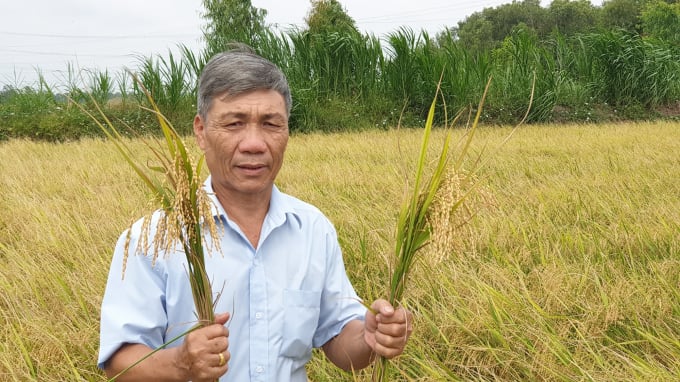
Changing the mindset on food security is a strategic breakthrough in the Mekong Delta Development Plan. Photo: Kim Anh.
“In general, the majority of participants are interested in determining the Center's specific, detailed, complete functions and tasks, with its position of inter-regional connectivity, and a profound impact on the growth and development of the agricultural sector. The completion of the project ensures feasibility, efficiency, and high market value", said Minister Le Minh Hoan.
Within the framework of the Workshop to announce investment planning and promotion in the Mekong Delta on June 21, Minister Le Minh Hoan shared: “Many international investors may not be able to identify each individual locality precisely, but everyone knows about the Mekong Delta".
The minister emphasized that linking the Mekong Delta is not a simple calculation of the population, area, and resources from 13 provinces and cities. It is openness, connection in mindsets, creating a harmonious relationship between "State - Market - Society", and a new development space.
Many large corporations and businesses have recently implemented large-scale projects of inter-provincial nature, promising to activate the potential of many localities. These are positive signals that demonstrate the creativity, dynamism and vitality of the Delta. The problem lies in the fact that we need to connect, spread these values. Afterwards, each locality, with its own specific conditions and strengths, will actively and harmoniously contribute to the overall economic space. The Mekong Delta will become a complete economic entity, operating flexibly and dynamically.
Translated by Nguyen Hai Long
/2025/05/25/4127-3-073637_820.jpg)
(VAN) Thanks to the promotion from an FAO-implemented project, vegetable production in greenhouses in Moc Chau has seen strong development, from 1.5 hectares in 2021 to nearly 50 hectares in 2024.

(VAN) FAO has recently supported USD 140,000 to implement the project 'Risk mitigation human-animal interface risks through disease control initiatives in pig farming.'

(VAN) The People's Committee of Tra Vinh province has approved an adjustment to the investment policy for the Green Hydrogen Plant project, increasing its area to approximately 52.76 hectares.
![Reducing emissions from rice fields: [2] Farmers’ commitment to the soil](https://t.ex-cdn.com/nongnghiepmoitruong.vn/608w/files/news/2025/05/05/dsc08881jpg-nongnghiep-140632.jpg)
(VAN) Clean rice cultivation model in Thuong Tan commune, Bac Tan Uyen district, is assisting local residents in achieving sustainable agriculture by substantially reducing costs, increasing productivity, and protecting the environment.

(VAN) At the conference to disseminate Resolution No. 68, AgriS introduced its digital agricultural ecosystem and reaffirmed its commitment to accompanying the Government in promoting private sector development and sustainable agriculture.

(VAN) 'Blue Ocean - Blue Foods' initiative is designed to restore marine ecosystems and establish sustainable livelihoods for local communities by cultivating a minimum of 1,000 hectares of cottonii seaweed in the first three years.
/2025/05/21/4642-3-112707_603.jpg)
(VAN) The V-SCOPE project has made direct contributions to three out of six pillars of the Comprehensive Strategic Partnership between Vietnam and Australia.